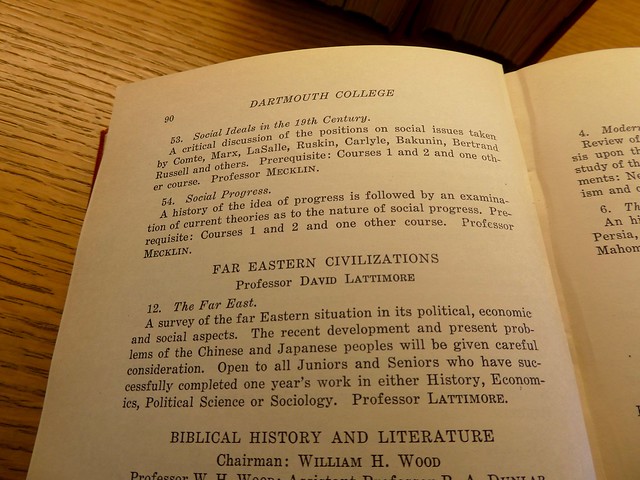Courses that have reflected contemporary social concerns:
Imperialism in and colonization of Asia and Africa is on-going until World War I.
1902: The Far East. Professor Lattimore. A survey of the far Eastern situation in its political, economic and social aspects. The recent development and present problems of the Chinese and Japanese peoples will be given careful consideration.

1911: Colonization. Professor Hawes. This course is devoted to the study of colonization by various nations, the condition, character, motives, and administration of each with special consideration of racial, educational, and other social problems in the dependencies.
The Eugenics Movement begins in the late 19th century and endured through time until World War II. To be sure, Professor Woods did not condone the act of sterilization in any way.
1916: Heredity and Environment in Human Society. Assistant Professor Woods. A study of the roles played by heredity and environment in the progress of society and of individuals, including an examination of the proposals of Eugenics.
In America, the Progressive Movement ends during the 1920s.
1920: Social Progress. Professor Mecklin. A discussion of current theories of social betterment.
Sociologists make sense of how other cultures/races are weaved into the fabric of American society.
1927: Immigration and Race Problems. Professor Woods. A study of the migration to America of certain races from Europe, Africa and Asia, and of the problems which arise from their presence here. Among other topics and restriction of immigration, the blending of cultural heritages, and present trends in the adjustment of the Negro to American life will be considered.
1931: The Ethnology of the American Indian (North America). Mr. McKennan. The Americas because of their isolation afford a splendid laboratory for the study of the development of culture, uninfluenced by the older civilizations of the Old World. This course deals with the aboriginal groups north of the Rio Grande, similarities and differences in their culture, growth of institutions, and the effects of diffusion and of environment. The archaeology and the mythology of the various areas are also studied. The student is introduced to some of the problems of American anthropology.
1970: Modernization in Latin America. Associate Professor Segal. An examination of patterns of economic, political, and social developments in various Latin American nations. Special emphasis will fall upon the importance of North American power, local elitism and oligarchy, and the prospects for genuine and successful revolutionary movements.
Natural disaster, Hurricane Katrina, hits New Orleans in 2005. Recovery is on-going for many years following.
2013: Hurricane Katrina, Social Disaster. Professor King.
In the early 2010s, the “millennial generation” begins to graduate college.
2013: This Generation. Professor Goodman. Many of you firmly believe that you are part of a distinct generation: A millennial generation. But are you a distinct generation? Also, many people believe that this generation is more tolerant, less racist and less sexist–but is it? You will be looking at these issues and trying to develop a position that is backed up by research and that does not just reflect the opinions of you and your friends.
In 2007, FDA brings up charges against Purdue Pharma. The opioid epidemic rages on.
2013: Drugs and Pharmaceuticals in Society. Professor Goodman. Licit and illicit drugs make illuminating case studies for our economic and political systems. We investigate the following questions: Are profit motives and humanitarian concerns in irresolvable conflict? Does the international network of illegal drugs show the future of globalization? Does pharmaceutical lobbying demonstrate the anti-democratic influence of money? Is the “war on drugs” political demagoguery or a rational response to human weakness? We will use readings, position papers and discussions to explore these questions.
The Financial Crisis of 2007-2008 creates the need to better understand the social roots of globalization and capitalism.
2018: The Sociology of Globalization. Professor Campbell. The international scope of political, economic, and cultural activity has increased dramatically during the late twentieth and early twenty first centuries. But how extensive has the trend toward “globalization” been? Is it really a new phenomenon? Has globalization changed societies? If so, how? If not, why not? Are societies becoming more alike because they experience common globalization pressures or do they retain their unique national characteristics? This course examines these questions and more. Specifically, we will look at how globalization has affected business, states, labor movements, social inequality, social welfare, citizenship rights, the environment, culture, national security, and other aspects of society.
2018: Capitalism, Prosperity and Crisis. Professor Parsa. Capitalism in the last five centuries generated great wealth and prosperity in Western societies. In the last few decades, capitalism assumed a global character affecting social and economic life of the vast majority of the people in the world. Yet, capitalism has also been plagued by economic decline and failures, causing massive human suffering. This course will study the nature of capitalism, sources of prosperity and crisis, inequality in distribution of economic and political power.